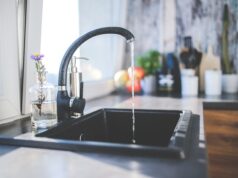Contents
The Pros and Cons of DIY Kitchen Sink Installation
Installing a kitchen sink can seem like a daunting task, but it’s one that you can do yourself. While there are benefits to installing a sink on your own, there are also drawbacks. Here are some pros and cons to consider before you dive into your DIY kitchen sink installation:
Pros:
- Cost: Doing it yourself can be much cheaper than hiring a plumber.
- Flexibility: You can work on the installation when it’s most convenient for you and take breaks when needed.
- Experience: Installing a sink yourself can give you valuable experience with plumbing and home repair.
Cons:
- Time: Installing a kitchen sink can take several hours, and you may need to take time off work to complete the job.
- Mistakes: If you make a mistake, it can be costly to fix, or you may need to start the installation over from scratch.
- Danger: If you’re not experienced with plumbing, there’s a risk of injuring yourself or causing damage to your home.
Ultimately, deciding whether to install a kitchen sink yourself comes down to your budget, experience, and confidence in your abilities. If you’re not comfortable doing it yourself, it’s always best to hire a professional.
The Pros and Cons of DIY Kitchen Sink Installation
Introduction
Installing a kitchen sink can be a daunting task, and many homeowners consider taking on the project themselves rather than hiring a professional. While there are certainly advantages to DIY kitchen sink installation, there are also drawbacks to consider. In this post, we will take a closer look at the pros and cons of tackling this project yourself.
Pros
Cost Savings
One of the most significant benefits of DIY kitchen sink installation is cost savings. A professional plumber can charge hundreds of dollars just to install a sink, and that does not include the cost of the sink itself. Taking on the project yourself can save you a considerable amount of money, which can be put toward other home improvement projects.
Control Over the Process
Another advantage of DIY installation is that you have complete control over the process. You can choose the sink that best suits your needs and preferences, and you won’t have to worry about a plumber suggesting one that may not be the best fit for your kitchen.
Satisfaction of Accomplishment
Completing a DIY project can be incredibly satisfying, and installing a sink is no exception. Knowing that you tackled the project and completed it successfully can give you a sense of accomplishment and pride.
Flexibility with Scheduling
By installing the sink yourself, you don’t have to worry about scheduling conflicts with a plumber. This can be especially helpful if you work during the day and can only tackle home improvement projects on the weekends.
Cons
Potential for Costly Mistakes
While there are certainly cost savings to consider, there is also the potential for costly mistakes. If you do not install the sink correctly, you could end up causing damage to your cabinets, countertops, or plumbing. Fixing these mistakes can end up costing you more than it would have to hire a professional, to begin with.
May Void Warranty or Insurance
Many sink manufacturers require professional installation to keep the warranty valid. Attempting to install the sink yourself could void the warranty and leave you without the protection you thought you had. Additionally, if you make a mistake that causes damage, your homeowner’s insurance may not cover the repairs if the installation was not done by a certified professional.
Time-Consuming
Installing a sink is not a quick task, and it can be time-consuming. This is especially true if you have never tackled a project like this before. You will need to invest a significant amount of time in research and preparation before you can even begin the installation process.
Limited Expertise and Knowledge
Finally, it is essential to recognize that you may not have the same level of expertise and knowledge as a professional plumber. This lack of experience could result in mistakes, frustration, and potentially costly damages.
Conclusion
In conclusion, DIY kitchen sink installation can be an excellent way to save money, exercise control over the process, and feel a sense of satisfaction after completing a project. However, it is essential to weigh the pros and cons carefully to determine whether DIY installation is the right choice for you. If you do decide to install the sink yourself, make sure to research thoroughly, follow all instructions carefully, and be prepared for the possibility of mistakes and setbacks.
Sources:
-https://www.bhg.com/home-improvement/plumbing/how-to-install-a-kitchen-sink/
-https://www.thespruce.com/pros-and-cons-of-a-kitchen-sink-1822092
FAQs about DIY Kitchen Sink Installation
What are the pros of doing a DIY kitchen sink installation?
- You can save money on labor costs.
- You have more control over the installation process.
- You can choose the sink and other materials you want.
- You can gain valuable experience and knowledge for future projects.
What are the cons of doing a DIY kitchen sink installation?
- You may make mistakes that could cause damage to your sink or plumbing system.
- You may not have the experience or tools required for certain tasks, like cutting and installing pipes.
- You may not be insured if something goes wrong, which could end up costing you more money in the long run.
- You may spend more time on the project than a professional would.
Who Can Install Kitchen Sink?
If you are remodeling your kitchen or building a new one, you may need to install a new kitchen sink. But who can install it? Can you do it yourself? Do you need a professional plumber? Here’s what you need to know.
DIY Installation
If you are handy with tools and have some basic plumbing knowledge, you can install a kitchen sink yourself. However, it’s important to note that this is not a simple task and requires patience, skill, and specific tools. You’ll need to disconnect the old sink and faucet, mount the new sink and faucet, and connect the plumbing. Be sure to follow the manufacturer’s instructions carefully, and check your work for leaks.
Professional Installation
If you don’t feel comfortable installing a kitchen sink yourself, or if you don’t have the time or tools to do it, you can hire a professional plumber. A plumber has the knowledge, skill, and experience to install your new sink quickly and correctly. They can also help you choose the right sink and faucet for your needs, and make sure everything is up to code.
Whether you decide to install your kitchen sink yourself or hire a professional, it’s important to choose a high-quality sink and faucet that will last for many years. Look for brands that are known for their durability and style, and don’t be afraid to ask for recommendations from friends and family.
If you want to learn more about kitchen sinks and their installation, check out Wikipedia’s page on kitchen sinks for more information.
Pros:
- Save money on installation fees
- Control over installation process
- Opportunity to learn and gain experience
- Flexible timeline to fit your schedule
- Can customize sink placement and design
Cons:
- Risk of damaging plumbing or kitchen cabinets
- May not have access to specialized tools or equipment
- Potentially time-consuming and labor-intensive
- No warranty or guarantee on installation
- May not meet building codes or regulations


































